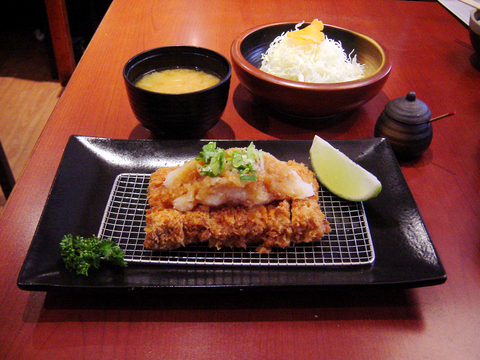If you think most Taipei urbanites are stuck in the rat race and would be too busy to stand in line for over 30 minutes to secure a pork chop for lunch, check out the tonkatsu eatery hidden behind the Cathay General Hospital on Renai Road. A beneficiary of the influence wielded by bloggers and online chat room gossipers, the restaurant's sets, consisting of a breaded, deep-fried pork cutlet served Japanese-style, are hot property.
Is the wait worthwhile?
Dinners can choose to fill up on the popular Japanese meal in two ways: traditional or innovative.

PHOTO: HO YI, TAIPEI TIMES
One option is pork chop served with daikon, or white radish, mash.
If simplicity is not your style, the restaurant does a range of pork cutlets stuffed with various fillings. For NT$310, patrons can make their own combinations of pork chop with two choices from over 10 options including cheese, kimchi, tuna salad, egg, crab meat and curry sauce.
Cheese tonkatsu seems to be the restaurant's tour de force. In one bite, the gooey cheese coats the chop's crispy layer and succelent meat creating a sumptuous trio of textures. The cheese and curry chop, on the other hand, tries too hard, and packs too much of a punch with a confusing array of flavors.
The kimchi option is sour, sweet, spicy and piquant, without one flavor dominating the dish. For those who want a feast for the eyes as well as one for the stomach, the laver and steamed eggs set and the plum sauce and crab option are must-tries.
Adding condiments to the meal is a treat in itself as diners are provided with pestles in which to grind white sesame seeds and other spices.
Fresh shredded cabbage, miso soup and high-quality rice come in unlimited supply with the sets.
As the establishment is pretty much full day and night, weekdays and weekends, the motto of the wait staff is to serve up the fare as quickly as possible with passable courtesy. Dishes are served at an admirable speed while wait staff politely ask permission to clean up empty plates from time to time. It is not an ideal venue for a lengthy tete-a-tete with an old lover. Don't hesitate to prevent the eager wait staff from taking away your half-finished food and be careful with the mustard dressing, it is fiery stuff and could have you wincing and blubbering through your entire meal.

On April 26, The Lancet published a letter from two doctors at Taichung-based China Medical University Hospital (CMUH) warning that “Taiwan’s Health Care System is on the Brink of Collapse.” The authors said that “Years of policy inaction and mismanagement of resources have led to the National Health Insurance system operating under unsustainable conditions.” The pushback was immediate. Errors in the paper were quickly identified and publicized, to discredit the authors (the hospital apologized). CNA reported that CMUH said the letter described Taiwan in 2021 as having 62 nurses per 10,000 people, when the correct number was 78 nurses per 10,000

As we live longer, our risk of cognitive impairment is increasing. How can we delay the onset of symptoms? Do we have to give up every indulgence or can small changes make a difference? We asked neurologists for tips on how to keep our brains healthy for life. TAKE CARE OF YOUR HEALTH “All of the sensible things that apply to bodily health apply to brain health,” says Suzanne O’Sullivan, a consultant in neurology at the National Hospital for Neurology and Neurosurgery in London, and the author of The Age of Diagnosis. “When you’re 20, you can get away with absolute

May 5 to May 11 What started out as friction between Taiwanese students at Taichung First High School and a Japanese head cook escalated dramatically over the first two weeks of May 1927. It began on April 30 when the cook’s wife knew that lotus starch used in that night’s dinner had rat feces in it, but failed to inform staff until the meal was already prepared. The students believed that her silence was intentional, and filed a complaint. The school’s Japanese administrators sided with the cook’s family, dismissing the students as troublemakers and clamping down on their freedoms — with

As Donald Trump’s executive order in March led to the shuttering of Voice of America (VOA) — the global broadcaster whose roots date back to the fight against Nazi propaganda — he quickly attracted support from figures not used to aligning themselves with any US administration. Trump had ordered the US Agency for Global Media, the federal agency that funds VOA and other groups promoting independent journalism overseas, to be “eliminated to the maximum extent consistent with applicable law.” The decision suddenly halted programming in 49 languages to more than 425 million people. In Moscow, Margarita Simonyan, the hardline editor-in-chief of the